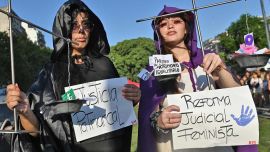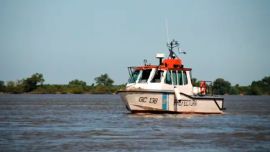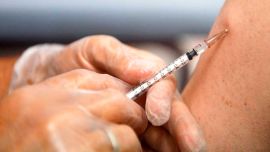ROSARIO IN SPOTLIGHT
President Alberto Fernández stepped up the presence of federal forces in Rosario on Wednesday after local residents reacted furiously to the fatal shooting of an 11-year-old boy last weekend, running amok last Monday and burning down five homes or bunkers linked to drug-trafficking. Accompanied by an unarmed corps of Army engineers, 400 more Border Guards are to be sent to the troubled city to join the 1,000 already there, as well as opening an office of the UIF (Unidad de Información Financiera) money-laundering monitor there. On Tuesday Rosario police announced the arrest of Maximiliano Castillo, 22, suspected of being one of the hitmen killing 11-year-old Máximo Jerez last Sunday, as well as wounding three of his friends. Prison cells in other provinces were also searched as part of a crackdown against detained drug-traffickers.
BOND SWAP
On Monday Economy Minister Sergio Massa reached an agreement with bankers and financial executives to swap debt bonds to the tune of 7.5 trillion pesos for new series with the payments falling due in 2024 and 2025, i.e. during the next government. Of the 7.5 trillion pesos (divided equally between the public and private sectors) around 3.1 trillion will be index- linked. The economic team is expecting around half the creditors to accept at tender.
INTERNATIONAL WOMEN’S DAY
International Women’s Day last Wednesday featured two main marches. one organised by the government with the hashtag ‘#FeminismoConCristina’ and its main demand “against the [electoral] ban” on Vice-President Cristina Fernández de Kirchner, while a march of leftist and independent organisations centred on the Ni Una Menos campaign against femicide among other demands for equality. The former group marched on Congress while the latter moved in the opposite direction towards Plaza de Mayo. Nuevo MAS leftist leader Manuela Castañeira said: “The mobilisation of March 8 is a date for all women and cannot be transformed into a government rally,” along similar lines to the argument of Grandmothers of Plaza de Mayo president Estela Barnes de Carlotto regarding Memory Day (March 24) later this month. Downtown bus services were affected.
DOLLAR MALBEC
Last weekend Economy Minister Sergio Massa availed himself of the appropriate venue of the Vendimia wine festival to announce a “dollar Malbec” as from next month (with its exact peso value yet to be defined) as the precursor of other exchange rate breaks for regional economies. He also had further good news for the wine sector – the United States has lifted all restrictions on the import of Argentine grape must or mash. The drought hitting grain harvests so hard has not spared wine production either with its volume estimated to be 21 percent down on the previous season. Massa announced 583 million pesos of support for the sector within the subsidised credit lines of 10 billion pesos for farming as a whole.
US EMBASSY BOMB SCARE
The United States Embassy in Argentina was hit by twin security fears last week after a suspicious device was found on the Palermo premises on Thursday, just a day after two Syrians with falsified documentation were detained on Wednesday. A link between these two developments has not been established. Both cases are now in the hands of federal judge Daniel Rafecas.
ALBERT’S POST-KIRCHNERISM?
There was a new outburst of infighting within the ruling Frente de Todos ruling coalition at the start of the week when in alleged off-the-record chats with ultra-Kirchnerite journalist Roberto Navarro, as posted by the latter’s publication El Destape, President Alberto Fernández spoke of "bringing 20 years of Kirchnerism to an end" in a hypothetical PASO primary with Chaco Governor Jorge ‘Coqui’ Capitanich as the Kirchnerite while he himself might possibly be represented by 2015 Peronist presidential candidate Daniel Scioli attempting a rerun. The Casa Rosada promptly denied the veracity of these statements but the publication did not withdraw them while the Kirchnerite Instituto Patria think tank took them seriously enough to rebut them with La Cámpora leader and Buenos Aires provincial minister Andrés "El Cuervo" Larroque rubbishing any presidential ambitions as “surrealistic … since the moderate variant is exhausted.” President Fernández insisted that a Frente de Todos victory was more important to him than his own re-election.
KICILLOF COY OVER SWAN SONG
Opening the 151st period of ordinary sessions of the Buenos Aires provincial legislature last Monday in a ceremony delayed by the massive blackout at the start of the month, Governor Axel Kicillof hinted broadly at a re-election bid by saying to thunderous applause: "Today is the last time I open these sessions or perhaps the last of this first term." Pointing out that 12 of the 26 players winning the World Cup came from the province, he moved onto more serious issues when he deplored the assassination attempt and the electoral “ban” against Vice-President Cristina Fernández de Kirchner. Congratulating himself on school classes starting on schedule four years running and on spending 10 times as much on public works as the previous Juntos por e Cambio administration, Kicillof spent several minutes criticising the Supreme Court’s “illegal” federal revenue-sharing ruling at the expense of his province.
UNITED LEFT FRONT
Last weekend the PTS (Partido de los Trabajadores Socialistas) wing of the Frente de Izquierda (FIT) leftist coalition proposed a single list headed by the presidential ticket of deputies Myriam Bregman and Nicolás del Caño (the FIT presidential candidate in 2015 and 2019) as the best far left synthesis in order to avoid splitting their vote in the PASO primaries in August. Bregman’s previous running-mate had been fellow-deputy Alejandro Vilca from Jujuy while the Trotskyist Partido Obrero (Del Caño’s party) had presented the ticket of City legislator Gabriel Solano and deputy Romina del Plá with the MST (Movimiento Socialista de los Trabajadores) naming Celeste Fierro and Alejandro Bodart as its hopefuls.
MALVINAS FLIGHT BAN
The government on Tuesday withdrew the authorisation for a monthly Córdoba stopover for regular flights between São Paulo and the Malvinas while blaming Britain for the lack of direct mainland links. These air services were agreed in late 2018 but were only operational for a few months before being unilaterally suspended by the United Kingdom due to the coronavirus pandemic in March, 2020, with little progress in the bilateral meetings since then. In late 2021 the Foreign Ministry proposed two humanitarian Aerolíneas Argentinas flights but the proposal was rejected.
CRISTINA & THE COURTS
The Federal Appeals Court on Wednesday recommended that Fernando Sabag Montiel, Brenda Uliarte and Nicolás Carizo all be sent to trial for the attempt to assassinate Vice-President Cristina Fernández de Kirchner last September while denying house arrest to Carrizo. The intended victim is not satisfied, faulting judge María Eugenia Capuchetti for not investigating those masterminding or financing the alleged plot, which extends to Juntos por el Cambio deputy Gerardo Milman in her opinion, as well as the family of Nicolás Caputo, a close friend of ex-president Mauricio Macri. On Thursday the TOF (Tribunal Oral Federal) court published its grounds for sentencing the vice-president to a prison term of six years and banning her from public office for life last December at the conclusion of the Santa Cruz highway contract corruption (‘Vialidad’) trial.
A SUITCASE FULL OF DOLLARS
Almost 16 years after the event, the case of the mysterious suitcase containing US$790,550 smuggled into Argentina by Venezuelan businessman Guido Antonini Wilson in August, 2007 but detected at Jorge Newbery Airport went on trial last Wednesday. The money represented part of the clandestine financing of Cristina Fernández de Kirchner’s 2007 presidential election campaign by the late Venezuelan president Hugo Chávez (who died 10 years ago last Sunday), as later admitted by Antonini Wilson in the United States (where he is now a protected witness). The defendants include former Federal Planning minister Julio De Vido and former AFIP tax bureau and Customs head Ricardo Echegaray.
SABRE TEETH
The discovery of the remains of dinosaurs and other prehistoric animals in remote Patagonia is not uncommon but last Tuesday the teeth giving the sabre-toothed tiger its name were found in Ezeiza within a stone’s throw of the international airport along with a bony fossil mass weighing some 100 kilos (yet to be identified) when Marcelo Sena was digging five metres below the ground. The next day the Bernardino Rivadavia Museum of Natural Sciences confirmed the paleontological importance of the find. The surprising discovery was nevertheless not the first in Ezeiza – in both 2015 and 2019 the fossil remains of glyptodons were unearthed.




















Comments